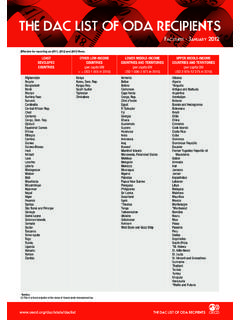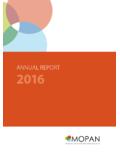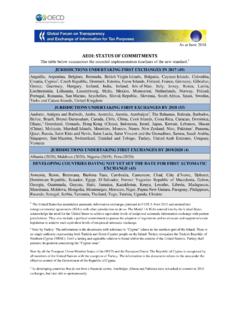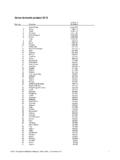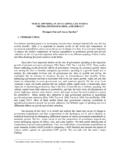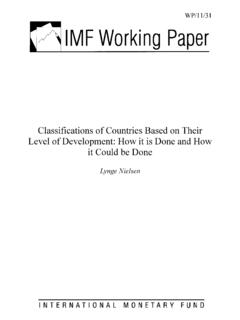Transcription of Gender transformation in the African Cashew value …
1 Date: Kai Pohlmann on behalf of the African Cashew initiative (ACi) Page 1 Gender transformation in the African Cashew value chain Findings from the African Cashew initiative s qualitative Gender survey conducted in Ghana and Burkina Faso - Production - Date: Kai Pohlmann on behalf of the African Cashew initiative (ACi) Page 2 Table of contents Page 1. Introduction: Gender in rural development and agricultural value chains 3-4 2. The African Cashew initiative (ACi) and its approach to Gender 4-6 3. Qualitative Gender survey: An overview 7-8 4. Gender -related findings 8 Finding 1: Cashew farming offers considerable benefits for women 8-10 Finding 2: Women do not face discrimination for being involved in Cashew production 10-11 Finding 3: In Ghana women have access to land and resources and grow their own Cashew , in Burkina Faso Cashew is a men s crop 11-13 Finding 4: The Gender division of labor in Cashew production is less rigid in Ghana than in Burkina Faso 13-16 Finding 5: Women are rarely involved in selling Cashew nuts and as buying agents 17-19 Finding 6: Women in Ghana are more involved in household decision-making than in Burkina Faso 19-22 Finding 7: ACi s intervention empowers women in farm work and household 22-30 Finding 8: Women s heavy workloads remain or have even increased 30-32 Finding 9.
2 Women benefit from memberships in farmer-based organizations but do not occupy leadership positions 33-39 5. Other findings 39 Reasons to grow Cashew 39 Access to credit 39-41 Child labor 41 Hired labor 41-42 6. Conclusions 42-43 List of figures and pictures 44 References 44-45 Annex: Summarized recommendations for policy-makers and practitioners 46-47 Date: Kai Pohlmann on behalf of the African Cashew initiative (ACi) Page 3 1. Introduction: Gender in rural development and agricultural value chains Following the phrase the African farmer and her husband (Commonwealth Secretariat 2001: 10), the literature holistically agrees on women s essential role in agriculture, especially in Sub-Saharan Africa ( African Development Bank 201; FAO 2011; OECD 2006; World Bank 2007; World Bank et al.)
3 2009) and suggests implementing organizations to take Gender -specific constraints in agricultural production and marketing into account. Being mostly subsistence and small scale farmers, women produce two thirds of the world s food and provide the majority of labor particularly for staple food crops; therefore women play an indispensable role in food security (World Bank 2007). Due to male migration, early death, separation and divorce there is a steady rise of female-headed households and many of these women are left behind without social capital and without effective decision-making power in communities. Women in general and female household heads especially experience several other hardships in their engagement in agriculture1. They lack access to land, credit, information and other resources, often as a result of unequal social and cultural beliefs and male-favored policies in statutory and customary law.
4 Furthermore, women in rural communities are not able to find employment and if they do experience lower wages and other unequal treatment (FAO 2002; USAID 2009; World Bank 2007). In addition, women in rural environments face many constraints with regards to attending school and are less educated than men or women living in urban areas (World Bank 2007). In the household, women carry out demanding unpaid domestic activities such as preparing food, sewing, cleaning and child- and relative-care as well as carrying water and finding firewood. In addition to these severe challenges women are moreover often not involved in decision-making and have no bargaining power so that they might not have control over their income and share of the household revenues. Various research carried out concludes that this is counterproductive since it is evident that women spend money more usefully and sustainably than men and invest for example in food supply and children s education (Visvanathan & Yoder 2011).
5 Time allocation studies demonstrate that women work more 1 Here, it is important to mention that a generalization cannot be made. The following information derives from research in multiple contexts and shows the challenges women often but not always face. Gender power Date: Kai Pohlmann on behalf of the African Cashew initiative (ACi) Page 4 hours than men, have higher burdens and are therefore not able to attend community or organizational meetings (Sen & Ostlin 2011; USAID 2009). Besides, since women organizations lack organization and leadership skills, participation and empowerment is not facilitated for achieving greater Gender equality. Coles & Mitchell (2011) argue that the aforementioned existing inequalities are likely to be reinforced in agricultural value chains.
6 Here, women do the hardest and time-consuming tasks on the farm and the household while men negotiate with traders and buyers, take over management and leadership roles and control the markets and mechanization (see also Duggan 2011). Again, the results are male domination, exclusion and discrimination of women and unequal power relationships. Moreover, as Mayoux & Mackie (2007) point out, women and men are mostly involved at different stages of the value chain and those areas where women contribute such as running the household are often less visible and ignored in analysis and development. As examined in different research projects and outlined in the Gender strategies of multilateral, donor and implementing agencies, investing in women s empowerment in rural contexts and agriculture does not only consider women s rights and creates greater Gender equity but does also lead to economic and agricultural growth and higher productivity levels.
7 The aim of this research is to examine if these general findings from the academic and institutional literature hold true for the Cashew sector and to what extent. This will be done after a short overview about the African Cashew initiative (ACi), the initiator of this survery, and how it approaches Gender in its intervention. 2. The African Cashew initiative (ACi) and its approach to Gender The African Cashew initiative (ACi) organizes and supports Cashew producers and processors in five project countries (Burkina Faso, Ghana, Benin, C te d Ivoire and Mozambique). It is expected that within four years (2009 to 2013), 5,500 new jobs 70% of them for women will be created in Cashew processing and that 150,000 small-scale Cashew producers will generate USD 15 million additional income per year. Including the producers family Date: Kai Pohlmann on behalf of the African Cashew initiative (ACi) Page 5 members, the targeted number of beneficiaries amounts to million rural poor and therefore highly contributes to sustainably reducing poverty.
8 Gender is an important component of the African Cashew initiative with one of its main aim being to promote employment opportunities mostly for women in the processing sector and ensuring women s equal representation and participation along the African Cashew value chain through mainstreaming activities. This is facilitated mainly through the involvement of women in trainings on good agricultural practices in Cashew farming. Moreover, since public and private partners are part of ACi, these sectors have a strong interest in Gender as promoting women s talents and capabilities has a positive relation to a strengthened competitiveness and increased profitability of the Cashew value chain. The Cashew industry traditionally relies on the participation of both women and men in production.
9 Women s involvement in farming is therefore not a new development and investment in the Cashew sector offers simultaneously an excellent starting point for an intervention to achieve women s empowerment and greater levels of Gender equality. With regards to quantitative figures, successes can already be seen: The latest rate states that currently 27% of the participants in farmer trainings are women surpassing the realistically set target of 20% - a strong success given the circumstances of prevailing male-domination in agriculture and the remarkably high total number of over 64,800 female farmers who have undergone trainings so far. : Farmers trained (all project countries) 0 Planned Actual Planned Actual Planned Actual Planned Actual Planned Actual Planned Actual Planned Actual Planned Actual Dec 09 Jun 10 Dec 10 Jun 11 Dec 11 Jun 12 Dec 12 Jun 13 Picture 1: ACi training situation (Ghana) Male Female Date: Kai Pohlmann on behalf of the African Cashew initiative (ACi) Page 6 Besides considering sex-disaggregated data and mainstreaming Gender within all project interventions, ACi moreover implements specific activities especially targeting women for income-diversification such as beekeeping or nursery management (innovative tools and approaches) and has various other instruments ensuring that Gender holds a vital place in the project (see Fig.)
10 2). Fig. 2: ACi's Gender approach The Gender survey is as also illustrated in Fig. 2 part of this approach and its findings will be analyzed in the sections below. The study was initiated to add a qualitative sphere to the consideration of sex-disaggregated data not only to verify successes, identify areas for improvement and give recommendations on follow-up action but also importantly to include beneficiaries and listen to their perception of the initiative. Instruments Sex-disaggregated data Qualitative Gender survey Policy dialogue Innovative tools and approaches Awareness raising Internal capacity building Method Mainstream and fully integrate Gender on all project levels Adopt specific Gender equality strategies and interventions Aims Allow equal representation and participation of men and women along the African Cashew value chain Empower women to have more meaningful impact on decision-making in four areas: household, community, farm and processing plant Date: Kai Pohlmann on behalf of the African Cashew initiative (ACi) Page 7 3.

